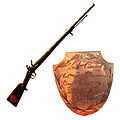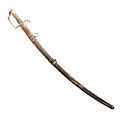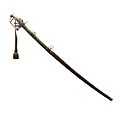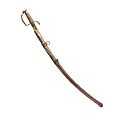Weapons of Honour
Weapons of Honour (French: Armes d'honneur) are ceremonial weapons awarded for service or assistance to France.
History
Established on 25 December 1799 and issued by the French Consulate, weapons of honour were awarded as military awards for feats of arms. The civilian version of this distinction is the scarf of honour (l'écharpe d'honneur). This completed and materialised the practice of solemnly declaring a citizen of group of citizens to have bien mérité de la Patrie.
Weapons of honour were replaced during the First French Empire by the institution of the chivalry Order of the Legion of Honour. Recipients of weapons of honour automatically received the Legion of Honour after its inception.
Categories
Each component of the Napoleonic armies had its own distinction and weapons of honour:
- Drumsticks given to the drummers
- Whips of honour awarded to the drivers of artillery
- Guns and swords awarded to soldiers and grenadiers
- Gold grenades to artillery assigned to the accuracy of their shots
- Carbines and rifles assigned to cavalry
- Pistols of Honour awarded to officers
- Trumpets assigned to the bugle and trumpeteers
- Sword of Honour (or Sabre of Honour), divided into three categories, are awarded for exceptional actions outside the scope of the items above.
-

Honour carbin: "The First Consul to citizen Jean Pansonnet, brigadier in the 12th hussard regiment, for outstanding deed".
-

Sabre of honour: "The First Consul to citizen Antoine Vigne, maréchal des logis at the 5th regiment of mounted chasseurs".
-

Sabre of honour: "The First Consul to citizen Rénade Conrot, maréchal des logis at the 5th regiment of mounted chasseurs".
-

Sabre of honour: "The First Consul to citizen Joseph Davance, sous-lieutenant of the 10th light infantry regiment, for outstanding deed".
Famed recipients
- George Washington (posthumous)[1]
- Claude Victor-Perrin, Duc de Belluno
- Nicolas Chauvin (apocryphal)
- Robert Surcouf
Notes and References
Notes
References
Bibliography
- Armes d'honneur via Napoleon.org (French)